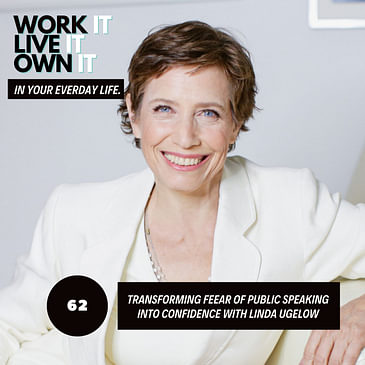In this episode, transformational speaking coach Linda Ugelow shares her personal journey from fearing public speaking to embracing it with confidence. Linda dives deep into the roots of public speaking anxiety, exploring how past traumas and experiences can hold people back. She highlights the importance of emotional healing and how turning anxiety into confidence is possible through the right mindset and practices. Linda encourages listeners to embrace self-expression and the joy of speaking by adopting techniques that lead to growth in communication skills and personal transformation.
This conversation is a must-listen for entrepreneurs and anyone looking to overcome their fear of speaking, enhance their confidence, and unlock their true voice.
Here's what you'll learn in this episode:
- Public speaking confidence
- Overcoming the fear of speaking
- Self-expression and personal growth
- Communication skills for entrepreneurs
- Emotional healing through expressive arts therapy
- Anxiety transformation techniques
- How to become a better public speaker
- Mindset shift for confident speaking
Key Takeaways:
- Linda wasn’t always comfortable with public speaking, proving anyone can grow from fear to confidence.
- The biggest mistake people make is ignoring their fear of public speaking rather than confronting it.
- The fear of speaking is often rooted in past negative experiences and trauma.
- Expanding self-expression is critical not only for overcoming fear but also for personal branding.
- Practicing presence and mental rehearsal are vital techniques to enhance communication skills and performance.
- Shifting from dread to delight in speaking is a journey every person can take.
Show Linda some love on:
LinkedIn: https://www.linkedin.com/in/lindaugelow/
YouTube: https://www.youtube.com/user/lindaugelow
Instagram: lindaugelow
Ready to join the WLO community to receive exclusive updates? Click the link: https://workitliveitownit.com/
Follow SaCola on Instagram: https://instagram.com/workitliveitownit
Subscribe to Work it, Live it, Own it! On YouTube: https://bit.ly/2lxB1TS
Email for business inquiries: info@workitliveitownit.com




